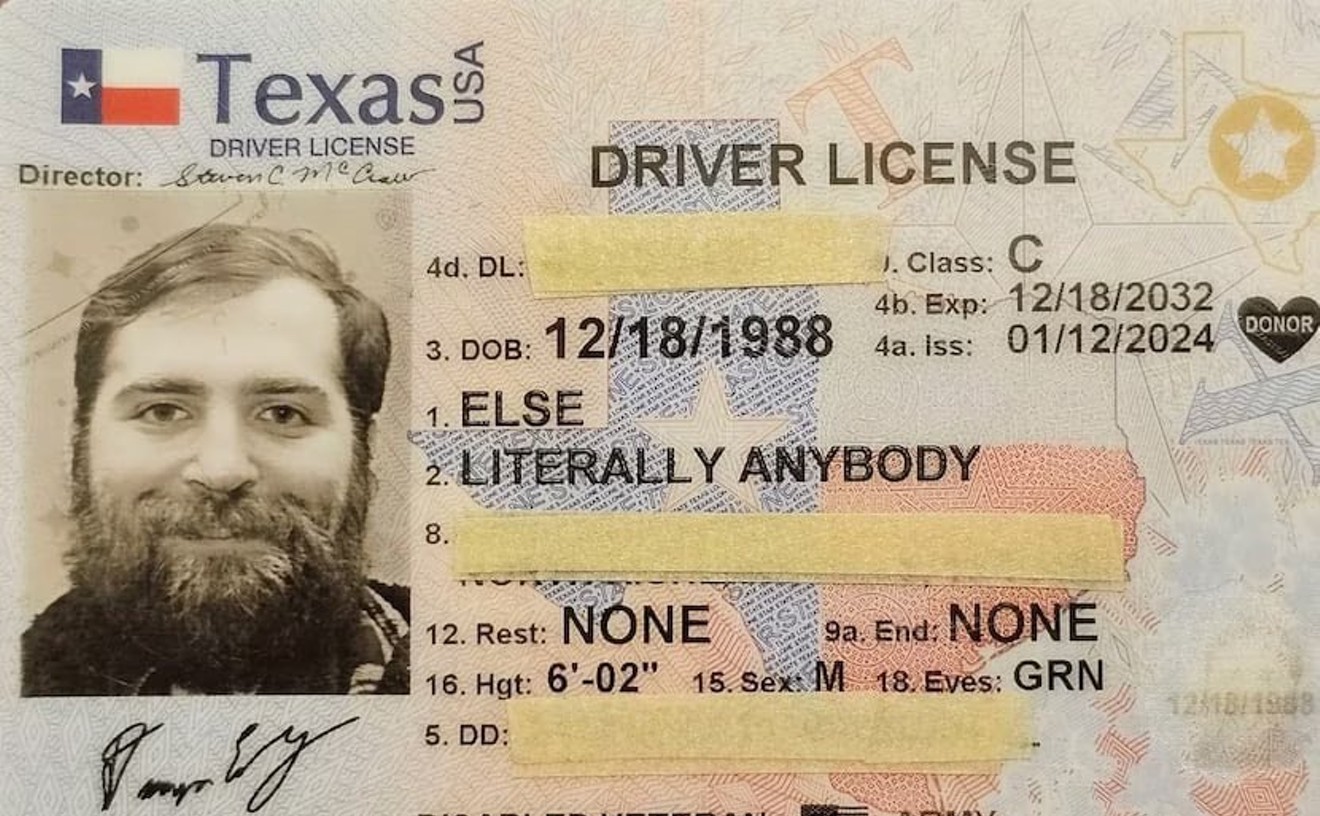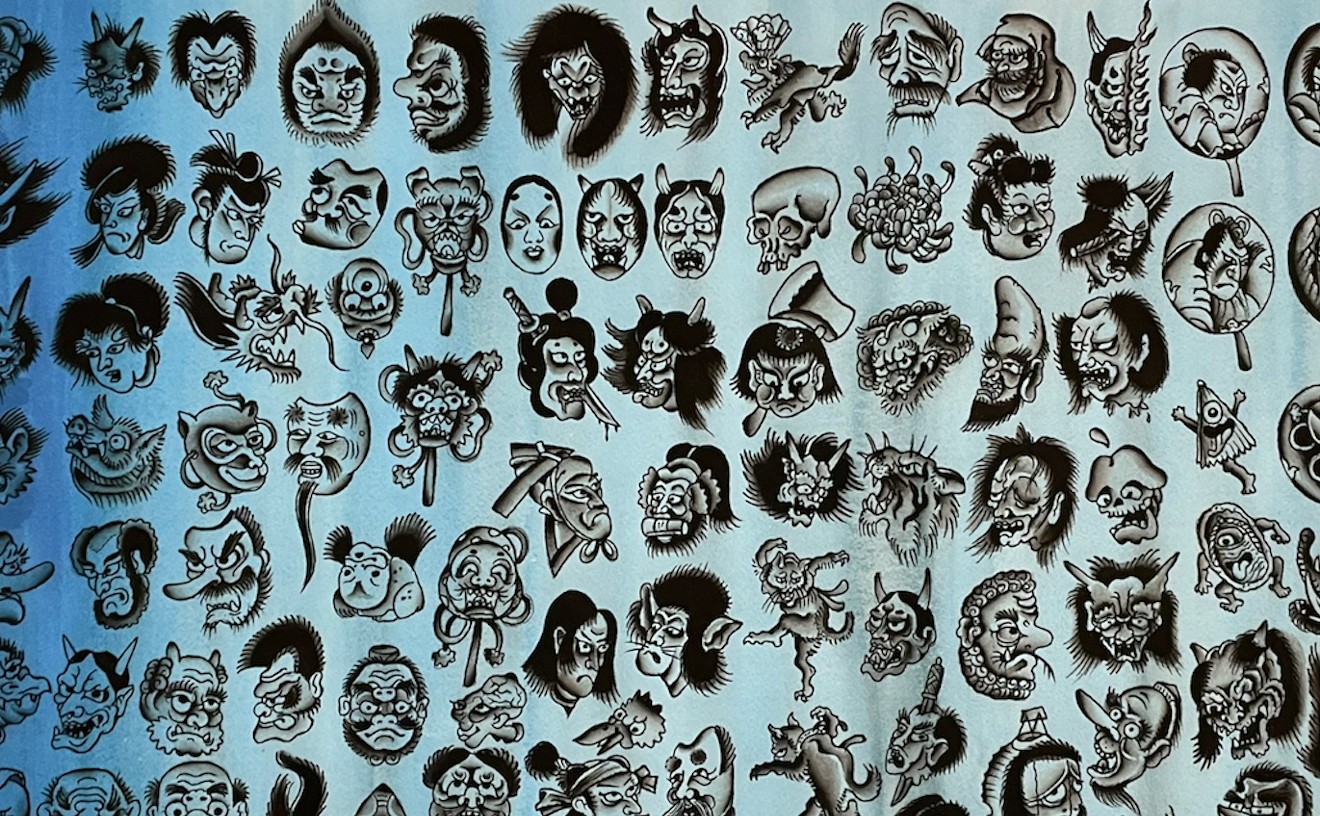The most exciting moment in a show done by Pegasus Theatre is that first glimpse of the set and actors as the curtain goes up. Performed in the company's trademarked "Living Black and White," Pegasus' tributes to vintage whodunit movies are designed to fool the eye of the viewer into seeing everything rendered in the silvery shades of 1930s celluloid. The visual pop of the thick gray makeup and color-free costumes and scenery is so disorienting that a glimpse of an actor's bloodshot eyes or pink tongue can come as a shock.
After the big reveal, however, comes the play, and it's here that Pegasus so often really lacks color. Company founder Kurt Kleinmann writes and stars in his own scripts as bumbling detective (and aspiring actor) Harry Hunsacker, a clueless sleuth who somehow manages to stumble into the solutions to homicides. Kleinmann's skills as playwright-actor are as uneven as his character's abilities as a professional shamus, so the comedies are never as funny as they could be, the mysteries never as complicated as they should be, the performance of the central character never as rewarding as it would be with someone better in the part. But when the technical whizbangery goes right, the many shortcomings of acting and plotting are easily forgiven.
The latest Pegasus effort, Death Express!, is a bust on all counts, however, committing too many crimes, script- and production-wise, to warrant any critical stays of execution. It's a revival of one of Kleinmann's scripts from the late 1990s, when the company had its own theater space in Deep Ellum. Since being forced out by rising rent in 2001, Pegasus has produced one show a year at Richardson's Eisemann Center. This year's, directed by Susan Sargeant, uses better actors than in the past, but fails at the one thing that sets Pegasus apart: those black and white special effects.
Set in the close compartments of a cross-country passenger train, Death Express! throws together a vampy French actress (Catherine DuBord), a fast-talking novelist (Marilyn Setu), a pair of tipsy gamblers (Mark C. Guerra, Greg Pugh) and a hick potato farmer (Josh Glover) and his pregnant wife (Leslie Patrick). As always, Hunsacker is on the scene too, accompanied by his paid-by-the-hour assistant, Nigel Grouse (Ben Bryant), and by an exasperated police detective, Lieutenant Foster (A. Raymond Banda), who hates Hunsacker's success as an investigator. When a wealthy passenger (Marc Rouse) turns up dead, then alive, then dead again, Hunsacker et al are on the case.
The particulars past that point in the story are mere trivia: Nazi spies, a scientific formula, hidden identities. The way the mystery unravels is a big letdown as whodunits go (its resolution is the exact opposite of Agatha Christie's Murder on the Orient Express). Kleinmann's clunky writing hints of heavy Hitchcock influences, with the master's movie titles (Strangers on a Train, The Lady Vanishes, Lifeboat) sprinkled in for film buffs. Kleinmann and Sargeant also try for some Marx Brothers-style slapstick, with the actors physically jostling themselves this way and that to simulate the acceleration of a "runaway train" as it speeds down the track. That's the funniest few minutes out of two hours.
Where it all goes off the rails, though, is in that black and white stuff. Something's not quite right this time with designer Dave Tenney's blocky two-tiered set (several un-plush train cars sit atop each other), Sam Nance's lighting, Aaron Patrick Turner's costumes and the makeup (a pre-show two-hour process done with the assistance of Rachel Schnitzius). Wigs glow in a distinctly yellow hue. In one outfit there's a hint of blue. And the gray makeup, instead of making everyone look like heavily shadowed glamourpusses in old Hollywood photos by Yousuf Karsh, instead turns the actors' faces a harsh silver and chalky white. Attack of the zombie robot tinman clowns.
As sloppy as Pegasus may have gotten with its visual gimmickry, they've also gone way over the edge with the acting styles, now as broad and hammy as the worst Saturday Night Live sketches. One of the best comic actors around, Ben Bryant, is wasted in Death Express! Written originally without Bryant's Nigel Grouse character—the one who actually solves the crimes and gets no credit for it—the play now has him in the mix but with nothing to do but follow two steps behind Hunsacker and Foster.
The second act picks up the pace after a slow-chugging first half, but compared to Pegasus' work in years gone by, Death Express! too quickly runs out of steam.
Over at Theatre Three, David Hare's Amy's View is one of those plays you want to tell to shut up. Over four acts—that's right, four—an aging stage actress, Esme (Connie Coit), her grown daughter Amy (Danielle Pickard) and Amy's boyfriend-then-husband Dominic (Kevin Moore) spend 16 years arguing the way characters in bad British TV soaps do—upright, face to face, talking themselves purple.
The subjects of their arguments aren't restricted to personal differences, which are considerable. They also fight about politics, the value of critics, art versus materialism, the fragile connections of in-laws once a spouse has died and other topics. Lots of them. A marathon of blah-di-frickin'-blah.
Esme is a spoiled grande dame, determined not to work in a medium as lowly as telly, then compelled by financial straits to take a supporting role on a sub-par medical drama. Amy's a selfish little twat, not ashamed to ask her mum for a four-figure handout, but too stubborn to admit she's incapable of earning a living herself. Dominic, a critic-turned-schlock-filmmaker, is a one-dimensional prat given to rants about how boring live theater is.
He has a point. Amy's View (reviewed at a preview) is precisely the sort of material that drives young people, and not a few older ones, away from theater for good.
The only compelling reason to see this play in its runs in London and on Broadway was the presence of Dame Judi Dench as Esme. She can make anything better—a play as flat as this, or a bad movie version of a good musical, as her husky-voiced solo in the film Nine attests.
But a small-d dame can't save Amy's View. And actress Coit, a regular at Theatre Three since the gaslight era, lacks the depth of technique of a Dame Judi that's needed for the emotionally heavy bellowing scenes. Costumed in garish kimonos and a turban (!), though the play's set in the 1990s, not the Roaring '20s, Coit, a chirpy little thing, becomes Debbie Reynolds playing Norma Desmond. As directed by Jac Alder, the actors stand like stick figures, arms hanging limply at their sides. Given that they're constantly pouring and swallowing brandies and sherries—you know, the way the English in plays like this always do—their characters' steadiness is admirable. Drunk, they might have been less starchy and more likable.
Playing Esme's elderly mother-in-law, the wonderful Terry McCracken gets off one or two sharp lines, and then her character spends most of the last two acts in a chair off to the side, napping as the others go on talking and talking. Just a guess: She wasn't acting.










